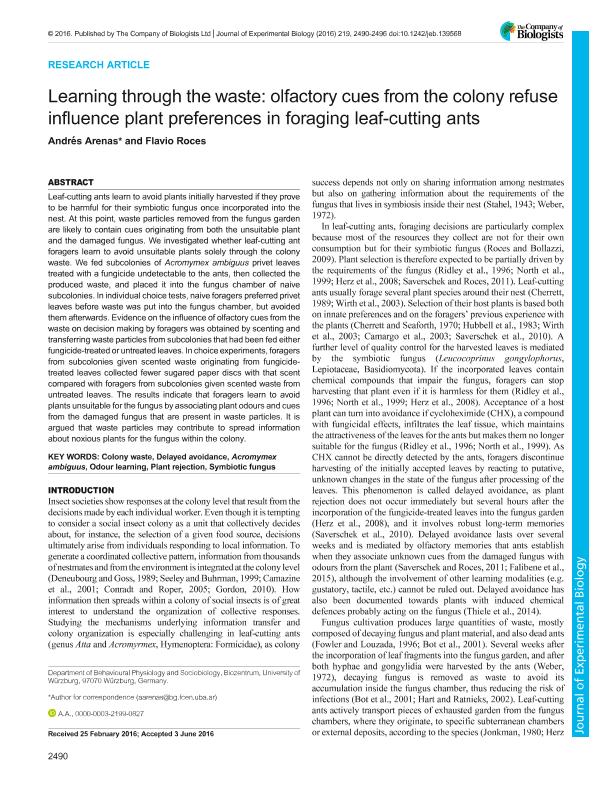Mostrar el registro sencillo del ítem
dc.contributor.author
Arenas, Andres

dc.contributor.author
Roces, Flavio

dc.date.available
2018-05-14T18:53:36Z
dc.date.issued
2016-08
dc.identifier.citation
Arenas, Andres; Roces, Flavio; Learning through the waste: olfactory cues from the colony refuse influence plant preferences in foraging leaf-cutting ants; Company of Biologists; Journal of Experimental Biology; 219; 16; 8-2016; 2490-2496
dc.identifier.issn
0022-0949
dc.identifier.uri
http://hdl.handle.net/11336/45121
dc.description.abstract
Leaf-cutting ants learn to avoid plants initially harvested if they proved to be harmful for their symbiotic fungus once incorporated into the nest. By this time, waste particles removed from the garden likely contain cues originating from both the unsuitable plant and the damaged fungus. We investigated whether leaf-cutting ant foragers learn to avoid unsuitable plants solely through the colony waste. We fed subcolonies of Acromymex ambiguus privet leaves treated with a fungicide undetectable for the ants, collected later the produced waste, and placed it into the fungus chamber of naïve subcolonies. In individual choice tests, naïve foragers preferred privet leaves before, but avoided them after waste was given into the fungus chamber. Evidence on the influence of olfactory cues from the waste on decision making by foragers was obtained by scenting and transferring waste particles from subcolonies that had been fed either fungicide-treated or untreated leaves. In choice experiments, foragers from subcolonies given scented waste originating from fungicide-treated leaves collected less sugared paper disks smelling to it, as compared to foragers from subcolonies given scented waste from untreated leaves. Results indicate that foragers learn to avoid plants unsuitable for the fungus by associating plant odours and cues from the damaged fungus that are contingent in waste particles. It is argued that waste particles may contribute to spread information about noxious plants for the fungus within the colony.
dc.format
application/pdf
dc.language.iso
eng
dc.publisher
Company of Biologists

dc.rights
info:eu-repo/semantics/openAccess
dc.rights.uri
https://creativecommons.org/licenses/by/2.5/ar/
dc.subject
Leaf-Cutting Ants
dc.subject
Odor Information
dc.subject
Waste
dc.subject
Delayed Avoidance
dc.subject.classification
Otras Ciencias Biológicas

dc.subject.classification
Ciencias Biológicas

dc.subject.classification
CIENCIAS NATURALES Y EXACTAS

dc.title
Learning through the waste: olfactory cues from the colony refuse influence plant preferences in foraging leaf-cutting ants
dc.type
info:eu-repo/semantics/article
dc.type
info:ar-repo/semantics/artículo
dc.type
info:eu-repo/semantics/publishedVersion
dc.date.updated
2018-05-11T20:55:02Z
dc.identifier.eissn
1477-9145
dc.journal.volume
219
dc.journal.number
16
dc.journal.pagination
2490-2496
dc.journal.pais
Reino Unido

dc.journal.ciudad
Cambridge
dc.description.fil
Fil: Arenas, Andres. Consejo Nacional de Investigaciones Científicas y Técnicas. Oficina de Coordinación Administrativa Ciudad Universitaria. Instituto de Fisiología, Biología Molecular y Neurociencias. Universidad de Buenos Aires. Facultad de Ciencias Exactas y Naturales. Instituto de Fisiología, Biología Molecular y Neurociencias; Argentina. Universität Würzburg; Alemania
dc.description.fil
Fil: Roces, Flavio. Universität Würzburg; Alemania
dc.journal.title
Journal of Experimental Biology

dc.relation.alternativeid
info:eu-repo/semantics/altIdentifier/url/https://www.ncbi.nlm.nih.gov/pubmed/27284068
dc.relation.alternativeid
info:eu-repo/semantics/altIdentifier/doi/http://dx.doi.org/10.1242/jeb.139568
dc.relation.alternativeid
info:eu-repo/semantics/altIdentifier/url/http://jeb.biologists.org/content/219/16/2490.long
Archivos asociados
